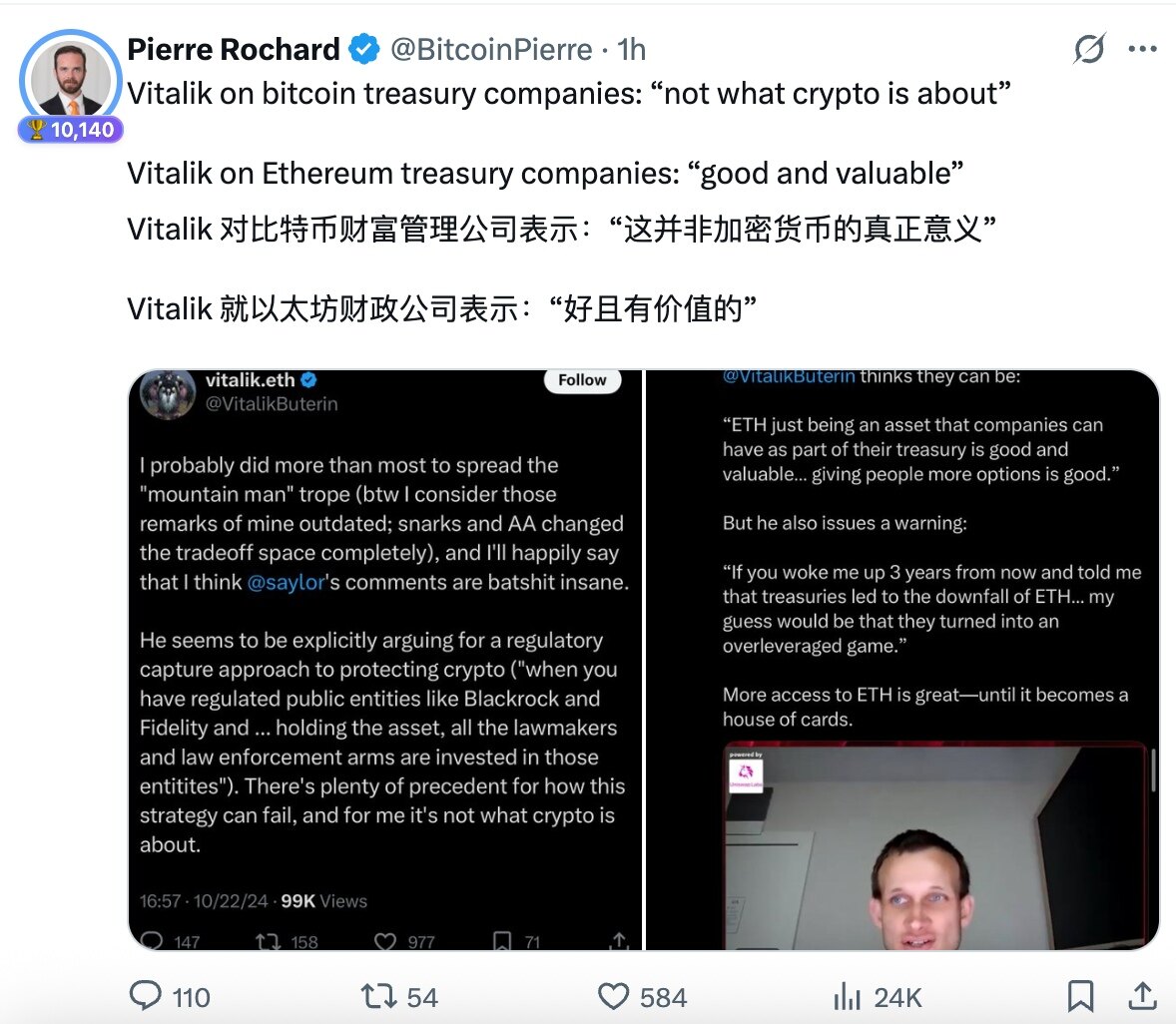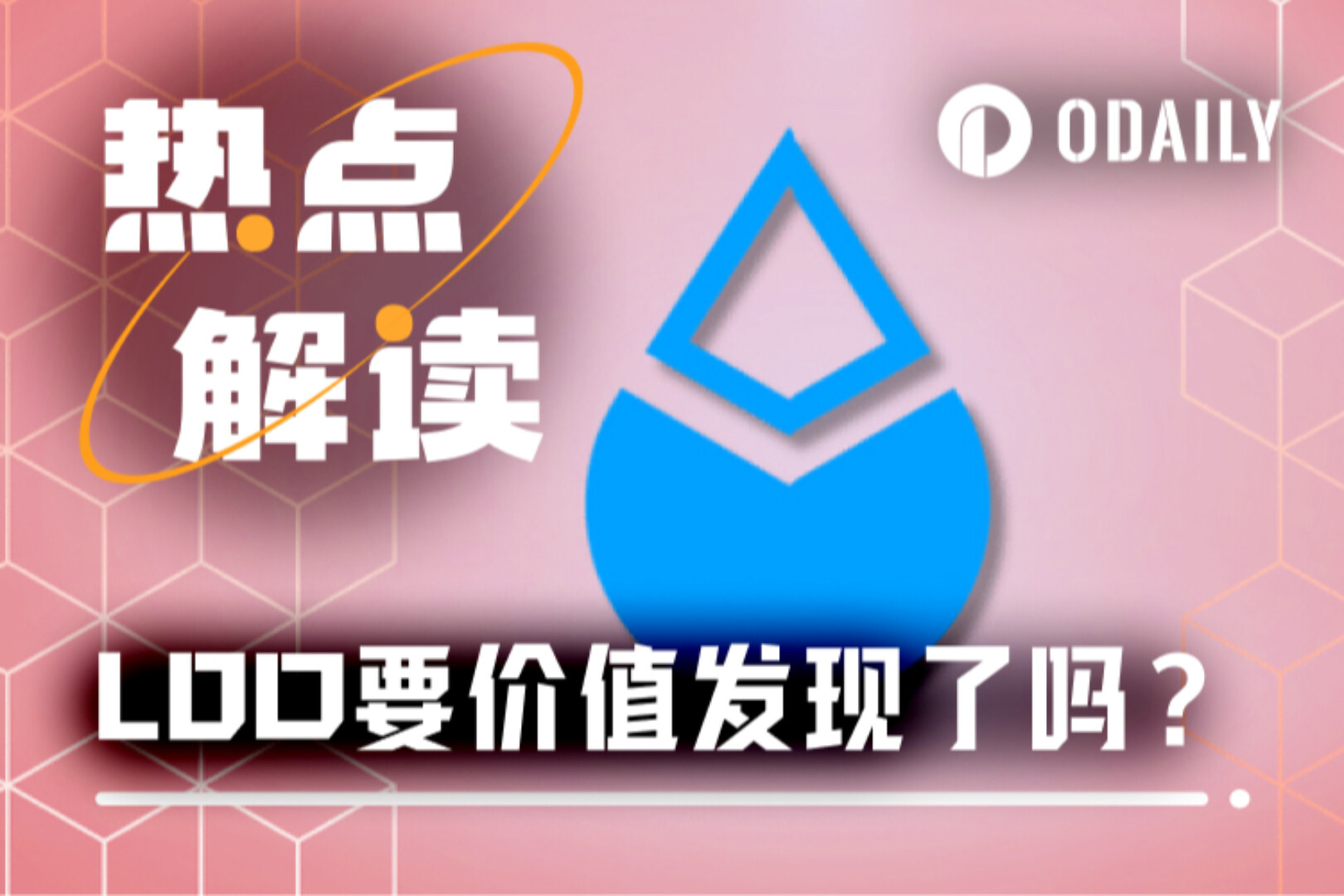Original | Odaily Planet Daily ( @OdailyChina )
By Wenser ( @wenser 2010 )

As ETH prices surged, reaching over $4,400 at one point, Ethereum founder Vitalik has retreated from his highly vocal stance last year, remaining behind the scenes and occasionally speaking publicly. His focus has also expanded from cryptocurrencies and the Ethereum ecosystem to include the recently hotly debated topics of ETH reserve strategies, AI models, and even the cultural differences between China and the United States.
As the Ethereum Foundation's reforms gradually progress and the ETH reserve strategy is in full swing, Vitalik seems to have finally relieved himself of the burdens of a founder, demonstrating a certain indifference and clarity of purpose. This article from Odaily Planet Daily will review Vitalik's recent public statements, offering a glimpse into his current thinking.
A brief analysis of Vitalik's recent situation: In addition to the Ethereum ecosystem, he is also concerned about culture and AI
On May 21st of this year, Vitalik updated his Farcaster account , revealing that a standard drink (a venti hot green tea) at a Starbucks in Switzerland cost 6.20 Swiss francs. Compared to 5.60 Swiss francs in 2014, the annual inflation rate in Switzerland is only 1%, his words lamenting the cost. (Note from Odaily Planet Daily: By comparison, the projected annual inflation rate in the United States from 2013 to 2025 is 3.35%).
Afterwards, after proposing the "ZK Verified Multi-Worker Allocation Conjecture" and a "German pun" , Vitalik was quiet for a while.
It wasn't until a month later that he posted again on Farcaster, accompanied by an image . The post, published on a Berlin channel, read, "Fuk bitcoins. Das ist unser Krieg." The image featured a photo of a graffiti wall with the words "Fuk bitcoins. Das ist unser Krieg" ("Bitcoins, go away. This is a war between us"). The graffiti is believed to be a slogan opposing support for Ukraine, originally meaning "This is not a war between us." The negation in the latter part of the sentence was erased, transforming it into a slogan calling for peace and support for Ukraine.
At that time, Vitalik may have been wandering the streets of Berlin, Germany, and spotted a Bitcoin-related slogan there, expressing his call for peace and his confidence in ETH and the Ethereum ecosystem. Subsequently, he shifted his focus back to the Ethereum ecosystem.
He still can't let go of his favorite Ethereum ecosystem
As the product of Vitalik's hard work, the Ethereum ecosystem is undoubtedly his most difficult and impossible technological achievement to give up.
Over the past three months, he has continued to make his own judgments and pay close attention to the development of the Ethereum ecosystem, its technical roadmap, and its governance. In summary, his main points of speech include:
1. Emphasize Ethereum's strengths and its commitment to decentralized development. For example, he offered his perspectives on the dual governance structure , the risks of zero-knowledge proof identity verification , a decentralized user protection system , and a proposal to enhance the Ethereum network's resistance to DoS attacks. He stated , "Institutions choose Ethereum not for its speed, but for its stability, reliability, and lack of downtime." This is also evident in a retweet of Ethereum's 10th anniversary post, which mentioned, "Ethereum has been online for 10 years with zero downtime and zero maintenance." Furthermore, he concluded, not surprisingly, that "Ethereum's success has exceeded everyone's expectations."
2. Focus on the Ethereum ecosystem and the development of the L2 network. Vitalik has recently repeatedly emphasized the priorities of L2 development, arguing that "the best approach to building L2 is to rely more heavily on L1 functionality and recommending that L2 simplify its logic to a sequencer and prover to minimize trust and avoid the need for a hard fork." He also stated that "Ethereum will eventually enable 'near-real-time' transfers of L2 native assets via L1." Furthermore, he emphasized that "L2 should prioritize fast withdrawals using a ZK system as its next phase . " As the proponent of the L2 solution, Vitalik remains an L1 fundamentalist at heart.
3. Enhance Ethereum L1 performance and reduce costs and increase efficiency. On the one hand, Vitalik supported raising the Ethereum L1 gas limit to 45 million through a community vote. On the other hand, he and Anders Elowsson jointly launched the EIP-0000 proposal, hoping to introduce a unified multi-dimensional fee market for Ethereum transactions. This would allow users to set a single max_fee for various resources (such as gas and blobs), improve capital utilization efficiency, and simplify the operational experience.
"Even ten years of drinking ice cannot cool your blood"—this saying perfectly describes Vitalik's passion for Ethereum. However, after experiencing last year's ETH price trough, Vitalik has stopped arguing with the market and users about who is right and who is wrong, and instead focuses on technical discussions and development, focusing on the overall growth of the Ethereum ecosystem.
Vitalik's two key priorities for decentralization: privacy and copyleft.
Recently, Vitalik's two major focuses under the banner of decentralized ideals also include privacy and open source.
Previously, the Ethereum Foundation donated $500,000 to support the legal defense of Tornado Cash developer Roman Storm . Vitalik also published a statement emphasizing that "backdoor-free private messaging tools have become widely accepted, and the United States should set an example and support developers."
He also wrote , "I have always supported permissive licenses because I want to maximize the adoption and dissemination of my work. Publishing under permissive licenses helps achieve this, as permissive licenses clearly state that anyone who wants to build on my work can do so without any concerns. Philosophically, I dislike copyright, appreciating the "copyleft" philosophy of 'using copyright against itself.' However, this thinking has shifted, and I'm starting to focus more on copyleft. Open source has become mainstream, making it more feasible to push companies toward open source. Companies like Google, Microsoft, and Huawei are embracing open source. Furthermore, competition in the cryptocurrency space is becoming increasingly fierce, driven by profit." (Note: Copyleft is a concept and licensing method that contrasts with traditional copyright. Copyleft licenses require that derivative works based on the original work be open source and licensed under the same license, ensuring that the work maintains its open and shared nature during its dissemination and development.)
Perhaps, in Vitalik's view today, if we enjoy the convenience of privacy and open source, we must also support it with the same attitude, rather than just enjoying the benefits without taking responsibility as in the past.
He is more concerned about AI than you might think.
Compared to cryptocurrency, many people may think that Vitalik's attitude towards AI is more negative, but based on his recent remarks, as a technology geek, he still maintains a high level of attention and vigilance towards AI.
Last month, he wrote : "I regularly remind people that AI is fully capable of dethroning cryptocurrency within weeks." Yesterday, he wrote again : " Rather than pursuing the most 'autonomous' AI possible, creating more paths for human input will not only improve output quality over the long term but also enhance security. I'm more interested in open-source AI models with robust editing capabilities than models generated from scratch. In the medium term, I hope to see advanced brain-computer interface technology that can display content in real time, sense user emotions, and dynamically adjust during the generation process." He also published a lengthy article specifically addressing his "Vision for AI 2027."
It has to be said that at a time when countless people are still superstitious about AI models or criticizing the content generated by AI models, Vitalik's expectations for AI are much more imaginative than those of ordinary people.
Are the cultural differences between China and the United States also his research subject?
In a July 21st Farcaster post , Vitalik mentioned his favorite "century dividing periods," including 1643-1648 (the transition from the Ming to the Qing dynasty, the end of the Thirty Years' War, the signing of the Treaty of Westphalia, the death of Galileo, and the birth of Newton); 1789 (the French Revolution, Lavoisier's promotion of the formalization of chemistry); 1911-1917 (the Xinhai Revolution, World War I, the Russian Revolution, and the theory of relativity); and 2020-2023 (the COVID-19 pandemic, the end of American rule, and AI passing the Turing test). It's clear that Vitalik is well-versed in both Chinese and international history.
In a recent post, he bluntly stated : "The cultural gap between China and the United States is still about four times larger than the cultural gap between generations (30 years). However, I predict that with the acceleration of technological progress and the deepening of global connectivity, generational differences will exceed national cultural differences in the future, and this may bring many unexpected impacts, such as the use of longevity technology as a means of cultural preservation."
In other words, as people live longer, national boundaries may become blurred, and generational differences will lead to people of different ages having different memories, thereby preserving different cultures in the memories of people of different generations.
Vitalik also talked about ETH reserve strategy: one of the means of diversified investment, but beware of "over-leverage game"
In addition to speaking out on personal channels, Vitalik also recently appeared in an interview on the Bankless podcast, a benchmark media outlet in the Ethereum ecosystem.
Regarding the impact of ETH reserves on Ethereum, Vitalik did not mince words and said , "ETH is a good and valuable asset that companies can hold, and providing more options is good."
But he also issued a warning: "If you wake me up in three years and tell me sovereign debt caused the collapse of ETH, my guess is that they became an over-leveraged game."
Of course, this statement is also seen as part of Vitalik's testimony in support of the ETH reserve strategy, which has attracted some criticism.
Some people dug up Vitalik's previous criticism of Strategy founder Michael Saylor for building BTC reserves, suggesting that his "butt determines his head." 
Vitalik’s “two-faced” approach?
But in my opinion, the times have changed, and at that time Vitalik's criticism of Saylor was more focused on the fact that Strategy, as a regulated listed company, its coin hoarding strategy might have a negative impact on the degree of decentralization of the cryptocurrency industry.
Looking back today, one year later, this has almost become a foregone conclusion after the approval of the Bitcoin spot ETF and Ethereum spot ETF; ETH's substantial recovery in the past three months and even the possibility of breaking new highs are precisely due to the main push from ETH reserve listed companies.
The development of history is not subject to personal will. Many times, for Vitalik, perhaps the direction of Ethereum and even the cryptocurrency industry is the same.
In March of this year, Vitalik changed the profile picture of his X platform account from the previous Milady NFT to the previously used druid bear form Tauren from World of Warcraft. The Twitter account profile was changed to "I choose balance. First-level balance. mi pinxe lo crino tcati" and posted a post titled "In Balance" published on the Slate Star Codex forum on September 12, 2018.
After turning 30, after the Ethereum network has been running for a full 10 years, and as the price of ETH returns to its highest level since the end of 2021, Vitalik, who was born in 1994, may also be slowly moving forward on his own path to forty, searching for his own destiny among various balances.
- 核心观点:Vitalik转向技术深耕与多元探索。
- 关键要素:
- 强调以太坊去中心化与L2发展。
- 关注隐私保护与Copyleft开源理念。
- 警惕AI风险并研究中美文化差异。
- 市场影响:推动以太坊生态长期价值。
- 时效性标注:中期影响。



